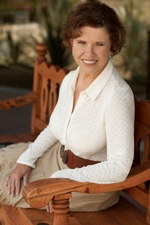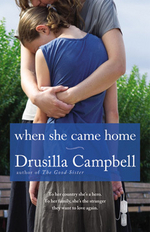 While writing her most recent novel, WHEN SHE CAME HOME, Drusilla Campbell had to find a way into her main character Frankie’s head. Frankie is a mother and a Marine, called to war by her desire to protect her own children and her country’s children. Drusilla recounts a story of her own fierce protectiveness, and the lengths to which she is willing to go to keep her kids safe --- including staging a nonviolent sit-in and spending a day in jail. She empathizes with Frankie and with all mothers who want their children to be happy and healthy.
While writing her most recent novel, WHEN SHE CAME HOME, Drusilla Campbell had to find a way into her main character Frankie’s head. Frankie is a mother and a Marine, called to war by her desire to protect her own children and her country’s children. Drusilla recounts a story of her own fierce protectiveness, and the lengths to which she is willing to go to keep her kids safe --- including staging a nonviolent sit-in and spending a day in jail. She empathizes with Frankie and with all mothers who want their children to be happy and healthy.
While plotting my novel, WHEN SHE CAME HOME, I knew I wanted to write about PTSD from a female point of view. My heroine had to be in the Marine Corps, married and a mother who decides to go for temporary active duty in Iraq. In some ways, it would have been easier to write the book if she’d been single or married without kids. But there are lots of moms in the armed services today. The more I did research for the book, the more their situations got through to me. These warriors entrust their children to fathers, sisters, aunts, grandmothers and friends when they deploy. Reading about their lives, I had a visceral, knee-jerk, OMG reaction.
How could they do it?
Eventually, these soldiers and sailors merged and became Marine Corps Captain Frankie Tennyson, the central character in my novel and --- to a lesser extent --- her friend, Domino.
Getting inside another person’s head as intensely as a fiction writer must is like being a method actor. I get kind of obsessed with the person I’m trying to bring to life on the page. My perspective shifts as I take on my characters’ personalities and circumstances. While writing this book, I had to channel my “inner marine.” I didn’t even know I had one.
Most military moms don’t choose to leave their kids behind. Frankie does. Those she trained with are serving in theaters of war, and it galls her that she’s stuck pushing papers in the finance office. Frankie is drawn to dangerous service because it breaks her heart to know that there were children on the planes hijacked on September 11th. She is compelled to do her part to see that such a thing doesn’t happen again. Not to her child, not to any child.
 When she has a chance to build a school damaged by years of war and deprivation, it seems like the perfect opportunity.
When she has a chance to build a school damaged by years of war and deprivation, it seems like the perfect opportunity.
To get inside Frankie, I first had to find a way to connect with her. To my surprise, that came by way of an experience I had when my boys were 11 and 8. Ronald Reagan was president and the Cold War was very cold. One day, I read a newspaper article about areas of Southern California considered prime targets for Soviet missile strikes. As it happened, our house was in the middle of a triangle of targets, and I saw immediately that if any of the three were hit, we would be instantly incinerated. I couldn’t stop thinking about my young sons, so full of life and potential. The only way I could stop obsessing was by taking action.
I joined an activist group planning a nonviolent sit-in at the General Dynamics plant that was, as it happened, one of those mapped targets. In the end, I was arrested and spent most of a day waiting to be bailed out of jail. I was tried in what became the biggest mass protest trial in San Diego history: The State of California v. Drusilla Campbell et alia. My husband, Art, was lead attorney. Despite his heroic efforts, we were found guilty, martyrs to the cause, and sentenced to hours and hours of community service.
I’m not equating my life of crime with the sacrifices made by moms in the military. But we mothers do share a sense of responsibility for our children’s welfare. Frankie felt she had to go to Iraq. I felt I had to protest the manufacture of cruise missiles in my backyard. Similarly, the mother who works two jobs to pay the rent, the mother who helps her daughter memorize sight words when she’d rather not, the mother who schleps her kids to soccer and football and tennis practice, wishing she were almost anywhere else: We all have this in common. We want our kids to have what they need for a good life: a roof over their heads, an education, strong, healthy bodies, and a peaceful world in which to live.


